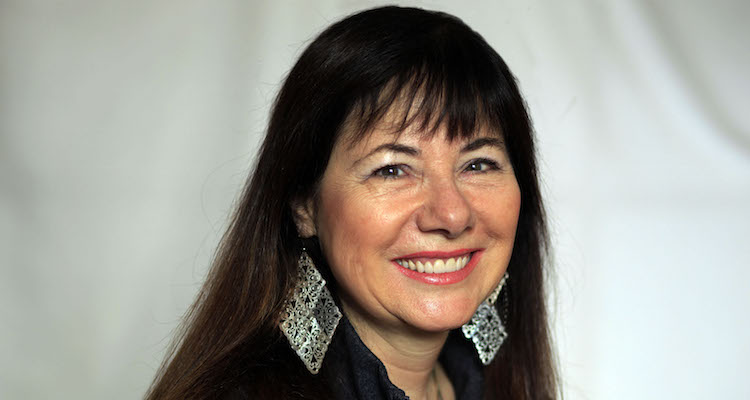Listen Now
It is pretty hard to convince people of the dangers and the precautions they need to take when you are talking to them in a foreign language.“ Lori Thicke has worked in languages for over 20 years. In 1986 she founded the Paris-based Lexcelera, a translation company which today has offices in Paris, London, Buenos Aires and Vancouver. In 1993 she co-founded Traducteurs sans frontières to provide pro bono translations to support global aid work. In 2010, Lori founded Translators without Borders, now the world’s largest community of humanitarian translators. Translators without Borders supports global aid organizations by donating millions of words of professional translations each year. With the creation of its translator training center in Nairobi, Kenya, Translators without Borders is actively taking down language barriers to knowledge for some of the world’s most disadvantaged people. You can connect with Lori here: http://lorithicke.com https://twitter.com/lorithicke
IN TOR 066 YOU’LL LEARN ABOUT:
- The value of translation in development.
- The value of intangible volunteer contributions, for both the subject and the donor, especially compared to monetary ones.
- Translators roadmap, massive acclaim, and how to prioritize work when there is no downtime. Hint: lot of Wikipedia.
- Lori’s view of the future of translation, including mobile penetration for disaster relief and the promises and limits of machine learning translation.
OUR CONVERSATION INCLUDES THE FOLLOWING:
Organizations
- Lexcelera http://www.lexcelera.com/en
- Traducteurs sans frontières
- Translators without Borders http://translatorswithoutborders.org/ https://en.wikipedia.org/wiki/Translators_Without_Borders
- Doctors without Borders
- Proz.com http://www.proz.com
- Zafen
- Kiva
- Humanitarian Innovation Fund (HIF)
- Wikipedia
- Indiegogo
Topics
- Translation and intercultural communication
- Intangible donations and volunteering
- Scalability
- Emergency relief
- West Africa ebola outbreak
- Crowdsourcing
- Machine learning translation
- IRS 501(c)(3) status determination for nonprofit organizations https://www.501c3.org/what-is-a-501c3
Places
- Nairobi, Kenya
- Paris
- London
- Buenos Aires
- Vancouver
- Haiti
- West Africa
EPISODE CRIB NOTES
From traducteurs to translators At university, always wanting to volunteer, but no time, for a long time. Doctors Without Borders (DWB) asked her for a quote, she decides she could donate translation hours as a volunteer. Development translation has very unique things. Witness reports helps broadcast from the DWB field. Speaks two languages. “I am the weak link.” Translators has over 120 language pairs (website: from Albanian to Zulu) Why translation, how Because being an expat in Paris, it slowly became obvious. Gained clientele. Years of professionalization. Proz.com provided platform for free, NGOs can request services there. Vetting process included. Lots of requests. “It’s a terrific business model, very appealing. We’ll translate well, for no cost.” Close to 9 million words translated a year, worth USD 2MM, thousands per translator. Organizations need translation for sponsorship and funding, mostly to European countries. Experience with Haiti’s Zafen, two site translations meant over USD 600K for them. The other way is bringing information out of and into a local language. Ebola in West Africa, there was a lot of distrust, some thought it was a government conspiracy. It was about talking their language. On the translators “They come from all walks of life.” From sophomores to retired. Little real time interpretation. Mostly written. Jobs have to be turned down, sometimes the cause is not worthy, sometimes there are shortages. People already have phones and many carriers offer free Wikipedia. Some project do receive funding, Wikipedia in African languages. HIF also sponsored disaster relief information translation. Volunteers decide their commitment. They fit about their current work. Turnaround is slower than original. Future: machine learning translation Still only evolving, especially in development. Too little data for a robust engine. More disaster relief, and automation is important there. Crowdsourcing. In Africa there are expert linguists but tools are not on par. Few paid staff, lots of volunteers. “It’s hard to be nimble.“ Managing growth with little staff The board has very influential people. The need is huge, needs to scale up. They also need funding for a CEO, Lori thinks it’s critical. 501(c)(3) status in the U.S. is important, gives a very good image. The board is strongly linked to the U.S. Account of mistranslation Many cases of missed deadlines, some of re-translation. “We’re very popular. We never have downtime. If we have resources left, they go to Wikipedia because it’s so scalable.” Advice Use your skills, it is secondary to what the market wants.Please share, participate and leave feedback below!
If you have any feedback you’d like to share for me or Lori, please leave your thoughts in the comment section below! I read all of them and will definitely take part in the conversation. If you have any questions you’d like to ask me directly, head on over to the Ask Stephen section. Don’t be shy! Every question is important and I answer every single one. And, if you truly enjoyed this episode and want to make sure others know about it, please share it now:[feather_share show=”facebook, twitter, linkedin, google_plus” hide=”reddit, pinterest, tumblr, mail”]
Also, ratings and reviews on iTunes are very helpful. Please take a moment to leave an honest review for The TOR Podcast!




